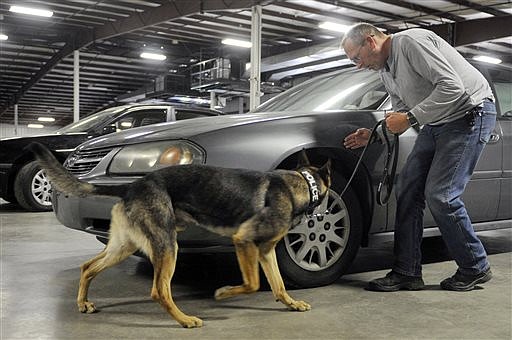COLUMBIA, Mo. (AP) - Nose first, a police dog searched for narcotics inside the Prathersville public works building, sniffing every tool bench shelf by shelf during canine training one Thursday with the Boone County Sheriff's Department.
Rodney Vansickle, an officer with the Lebanon Police Department, guided Zidane, a 16-month-old German shepherd mix, with his hand through the building, neither knowing where a sheriff's deputy hid the drugs. Vansickle paid attention to Zidane for changes in breathing and direction - cues signaling the high-energy dog might have found drugs.
Zidane sat after smelling heroin tucked into a brass pipe connector.
As his reward, Zidane and Vansickle played with a toy for a few moments. For positive reinforcement, Vansickle repeatedly said "Good boy!" in a high-pitched tone.
The Columbia Tribune reports (http://bit.ly/2eMp9LR ) that the Boone County Sheriff's Department is holding an eight-week training course for three new police dogs, two with the Lebanon Police Department and another with the Rolla Police Department. The dogs are learning obedience, drug detection, tracking, searching buildings and criminal apprehension primarily at the Central Missouri Events Center, a 128-acre property.
"The canine is a locating tool, and there's no other technology out there that can duplicate what a dog can do for us," said Chris Smith, Boone County deputy sheriff and canine officer. "Whether that's searching for narcotics or finding people, there's no other tool that's as effective as what we can get from a police dog.
The Boone County Sheriff's Department started offering canine training to other departments in 2013. The sheriff's office also offers refresher training sessions for police dogs and their handlers as well as for an explosives detection dog with the University of Missouri Police Department.
New dog training, at 40 sessions, costs the Lebanon and Rolla police departments $3,600 for each handler. Boone County typically offers training opportunities in the spring and fall, but added a summer course this year, Smith said.
Training fees go directly to Boone County's canine unit, and starting this year, the unit is fully funded using that money, Smith said. Before offering canine training, the department would spend $8,000 to $9,000 annually to receive training. The department previously sought public donations for new dogs, training and equipment, but when the Great Recession hit, the contributions lessened and spurred the decision for the department to offer training sessions.
The sheriff's office also wanted to make the training accessible to smaller departments in Mid-Missouri and surrounding areas, Smith said.
To offer the training, Smith attended a 12-week trainer's course in 2012 at Shallow Creek Kennels in Pennsylvania. Two years later, he received certification through the Missouri Police Canine Association.
The biggest costs for a canine unit are the dog and training sessions, which Smith said can add up to $15,000 to $20,000.
Then departments must factor in vehicle equipment, kennel housing and other expenses.
New dog training starts simple, slow and with lots of play time, Smith said. Dogs begin hunting for their toys, then drug and human odors are added to those toys. Eventually, the dog's nose is trained to solely find the odors and they are rewarded with a toy and brief playtime after making their discoveries.
Play between the dogs and handlers establishes trust that is built on throughout the training sessions, Smith said.
"Everyone has a pet and develops a good close bond, but these handlers are out working with their dogs every day," Smith said. "The dogs live in their house with them, and they could be putting their life on the line with this dog. It's a bond like nobody else has."
Vansickle handled a police dog four years ago, which was used frequently for drug searches and sometimes by other agencies. His new dog, Zidane, is an exceptional hunter, he said, but is also mild-mannered and gentle for public interaction and home life.
At the end of work days, Zidane will go home with Vansickle and be a part of his family, which includes three children, ages 14-22.
"To them, it's a dog," he said. "To me, it's my partner."
___
Information from: Columbia Daily Tribune, http://www.columbiatribune.com

